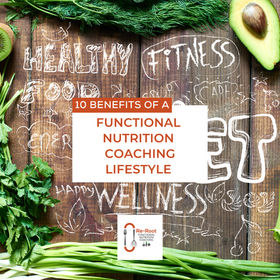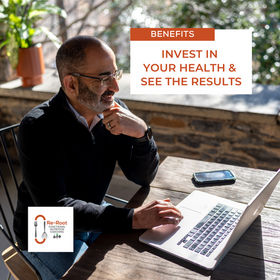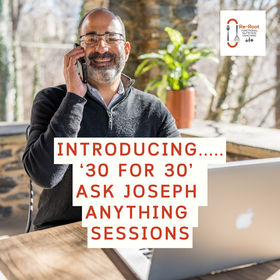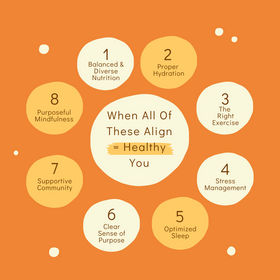
So, you have discovered that you need to make your health and well-being a priority. Either through finding out about a health diagnosis and being referred by your physician, or potentially just wanting to improve certain lifestyle aspects like sleep hygiene, quitting smoking, or wanting to get in shape. The truth of the matter is this; finding the best coach for you is just like purchasing underwear. Finding the "right fit" is the most important aspect of the coaching process (no matter what area that you want to focus on). And just like poorly fitting under pants, if you don't find the coach that fits you best (and that you feel resonates with your personality) all that's going to happen is they are going to ride up your ass and provoke some serious resistance, no matter what amount of education or experience they might have.
Now that we have that out of the way, we can get to some of the "nitty gritty" of finding the coach that is going to help you be the best version of yourself.
Choosing to work with a coach seems like a simple solution but can actually be a complicated process, particularly if you aren't crystal clear on what your options are. There are a lot of choices, and with so many factors it can be hard to decide which type of coach is going to be the "right" fit for what you are looking to do. Doing a google search for "coach in my area" brings up a plethora of results and it can be a huge challenge to know which type of coaching is what you are looking for. For even more confusion, in the realm of alternative health many terms are used interchangeably even though they are not the same. There are also a lot of different options that coaches choose for their education and credentialing. It seems important to bring up that for many of the coaching professions, there are very few regulatory organizations currently. That makes knowing what each form of coaching is (and isn’t) even more important because there are a lot of different qualifications but not a lot of regulation to ensure that each certified coach is staying within something called a scope of practice (SOP). Regulatory bodies such as the National Board for Health and Wellness Coaches (NB-HWC), International Coaching Federation (ICF), American Council on Exercise (ACE), and the National Commission for Certifying Agencies (NCCA) are several regulatory agencies for different categories of “coaching” (and ones that a potential client should keep an eye out for if looking for a prospective coach as each requires specific educational and experiential requirements, as well as extensive examinations to be completed in order to use the credentials that they provide). To clarify, just about anyone can hold a certificate as a “X coach” by completing a coaching program (and there are organizations out there that use the term "wellness coach" or "health coach" that are not accredited through a regulatory body- a couple of aromatherapy MLM's are the first who come to mind). The certificate is received once a program is completed. However, if that program meets the requirements of a credentialing organization, one can then apply to receive the additional credential after completing the requirements of that particular organization. As an example, someone can complete medical school and become a doctor, but they are not eligible to practice medicine until they have passed their board examinations and received their license. Same deal, except there is nothing saying that once a coach completed their program they cannot immediately begin to work with the public (and nothing saying that companies can't give certificates out to people even if their program isn't accredited). Coaches who choose to take the extra step to show their knowledge and experience will have the additional credentials.
The first step in choosing a coach should be asking yourself what it is that YOU are looking to accomplish. Until you know what road you want to be on, any road will get you there. So, let’s clarify the different choices that one has and what the difference is between the categories of the more commonly known coaching practices. There are approximately 31 different categories (sometimes referred to as niches) of "coaching", and well over 150 subcategories. This article is only to give a brief summary of the more popular choices, but there are definitely extremely specific options that are available. Some of the most common categories are fitness coaches and personal trainers, nutrition coaches, life coaches, health coaches, wellness coaches, then health and wellness coaches. As already mentioned, within these categories are also different subcategories/niches that can include things like relationship/intimacy coaching, transformational coaching, business coaching, leadership coaching, women’s/men’s health, financial coaching, even “happiness” coaching just to give you an idea. Although they are all considered "coaches" they are different in their practices as well as their education and certification. To make things even a bit more confusing some of them even overlap with what is focused on and the approaches that they use.
Fitness coaches and certified personal trainers (CPT) are a pretty familiar category. These are professionals that have chosen to focus completely on the physical dimension of health. They typically work one-on-one in a fitness setting, or maybe even work with clients online. They provide clients with the appropriate types of workouts, movements, and training regimens to improve physical fitness. Many also teach group classes, but that is not always the case. They might also have some amount of training in basic nutritional requirements and many even have a second certification as a nutrition coach. Most fitness/nutrition coaches focus on dietary suggestions that are aligned with weight loss in conjunction with exercise. However, they do not have the ability to work with clients on prescriptive diets for chronic illnesses as that would require being a registered dietician (which they can be if they have done the educational requirements and subsequent licensing). There are multiple routes for national certification by a personal trainer/fitness coach such as the NASM, ACE, ACSM, or NCCPT to name a few. If you are looking to lose some weight, or increase cardiovascular health, or just increase overall physical fitness these are the professionals for you. It is also important to remember that personal trainers are not physical therapists, and if you are looking to rehabilitate an injury (rather than improve upon current physical fitness) you should look to a physical therapist first in order to get prescriptive movement techniques for your previous injury prior to working on improving physical activity.
Life coaches are a category that people are also becoming more familiar with. Some even use this particular category as an umbrella for the other forms of coaching although that isn't really accurate. Life coaches work with clients who want to focus on increasing their personal satisfaction, improving relationships, professional development, financial planning, and purpose. The main focus of life coaching is personal growth, achievement, and finding a greater sense of fulfillment in all areas of life. They help their clients identify the area's of their passion, and then support them in building goals that reflect improving those area's. Ultimately, this category of coaching is about finding clarity and achieving more a balanced lifestyle. Life coaching can have a slight amount of overlap with wellness coaches and health coaches in area's of stress management, goal setting, and healthy habits. However, life coaching really focuses on personal and professional fulfillment. There is no board certification for life coaches per se but they can register with the ICF if their program is approved by them. There are many life coaching programs that range from 6 week intensives to 6 months. Many successful professionals, politicians, and executives utilize life coaches in both their personal lives as well as their corporate teams. If you are looking to get out of a rut, and look at where you are at with your relationships (to yourself and others), your professional choices, or your intentions with your current circumstances a life coach is the professional you are looking for!
Here is where the "coaching" lines start to really get blurred.
When we look at wellness coaching, the first matter that should be addressed is what "wellness" is. Although the terms "health" and "wellness" are used interchangeably (and pretty regularly) they do not mean the same thing. Wellness by definition has to do with our personal well-being. There is no "set point" for wellness, as one can achieve "wellness" without being in a state of total "health" or free from disease. Wellness is a mindset and something we value, not necessarily a physical attribute. It is also not "static", and is a conscious, continual state of being and decision making that lead to the most optimal levels of health for each individual. Wellness coaching reflects these concepts. Wellness coaches will focus on what is keeping their clients from achieving their highest levels of satisfaction/wellness. Time management, emotional/mental health, personal organization, relationship conflicts, and stress management are all things that may be keeping an individual from "making peace" with their lives. Wellness coaches share quite a few similarities with life coaches, but they are definitely not the same. There are quite a few organizations that are completely dedicated to wellness like the Global Wellness Institute that provide an amazing amount of insight into this particular field. If you are looking to develop a healthier mindset, which improves physical, emotional, and spiritual satisfaction a wellness coach might be where you want to look.
Which takes us to health coaches, and what "health" is in the context of coaching. When most people talk about "health" it is in reference to being "free from disease or illness" which although seems correct, isn't. Health is more than just the absence of disease, and health coaching reflects that. As with wellness, there is a strong overlap here and the subtleties are where there might be some confusion. With health coaching, there is an emphasis on implementing long term, sustainable lifestyle changes that impact physical health and healing. Health coaches have training in chronic disease prevention, and management. This is the most dramatic difference between a health coach and the other categories. Although health coaches do not diagnose, or treat disease they do work with their clients to create strategies that implement previous diagnoses and treatment plans. A strong focus on lifestyle medicine is typical of health coaches. Sleep hygiene, stress management, dietary patterns, sedentary lifestyle, addiction, basically anything that has an impact on chronic diseases is in the health coaching category. Most health coaches use specific, evidence based theories during the coaching sessions to support their clients. Many coaches (myself included) have extensive education in behavior change theory, performance psychology, positive psychology, the science of motivation, longevity (healthy aging), as well as disease management. If you have a chronic health condition, want to quit unhealthy habits, want to make healthier dietary choices, or prevent disease then working with a health coach might be a good fit.
Now that we have those two particular types of coaches a little more defined, lets erase all the lines and come to Health and Wellness Coaches (HWC). These coaches have training in both wellness coaching, and health coaching. They cover all things "health" and "wellness". Depending on where you look, there are between 6-12 dimensions of health. Physical, social, intellectual, emotional, spiritual, financial (just to name a few) and HWC cover them all. Many of these coaches will focus on a particular aspect of health and wellness, but not all. Because coaching is not about being an expert who tells you what you "should", "could", "need", it is about YOU being the expert in your life. If there is something that is impacting your health and you know you want to change it, but don't feel motivated or know where to start, or how to make the changes last finding a health and wellness coach would likely be of great support to you.
It is important to make note that no matter what type of coach you are looking for, no coach is a mental health professional. There is a difference between looking for motivation, and depression. Yes, coaches can help you work with your anxiety but if it is creating debilitating issues then coaching isn't where you should look. All coaches are trained to look for particular conversational warning signs that indicate that their clients may need a referral. This doesn't mean that coaching isn't right for you, but if there is potential for underlying trauma, abuse and neglect, or a potential clinical mental health condition your coach might need to make sure that you are getting all the support that you need which might mean including someone who has qualifications in those area's.
Finding the right coach can take time, and personal introspection to know what type of coach your are really looking for. These summaries are not meant to be "all inclusive" and you may find coaches that carry one or all the qualifications that have been covered. Coaches are finding that being qualified in more than one category is beneficial for both clients and themselves. The search for a good coach can be tedious, but it doesn't have to be impossible. If you think that you have found a coach that you would like to work with that has training in what you want to improve, the best thing you can do is reach out to them directly. Most coaches will offer a "complementary" session to let you discuss what you are looking for and tell you how they think they can support you. This is probably the best way to figure out if a coach is going to be one that you want to work with. Their education and experience is important in order to make sure that your coach has been thoroughly trained in their field but that is no indication that they feel empathetic, compassionate, supportive to YOU.
And really, that is the most important aspect of having a coach.
(Originally published on https://kaecesshealth.com/decisions-decisions-choosing-a-coach)







